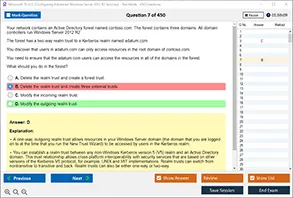Introduction
Ansible is a powerful open-source automation tool used for configuration management, application deployment, and task automation. As organizations increasingly adopt DevOps practices, Ansible has become a critical skill for IT professionals. Whether you're preparing for an Ansible-related job interview or looking to enhance your automation knowledge, this guide covers the most important Ansible interview questions and answers.
This article is designed to help you master Ansible concepts, from basic to advanced levels. Additionally, for those seeking well-structured exam preparation materials, Dumpsarena offers reliable Ansible certification dumps and study resources to help you succeed.
Basic Ansible Interview Questions
Q1. What is Ansible?
Answer:
Ansible is an open-source automation tool used for IT tasks such as configuration management, application deployment, and orchestration. It uses a simple YAML-based language (playbooks) to define automation tasks and works over SSH, requiring no agents on remote systems.
Q2. How does Ansible work?
Answer:
Ansible works by connecting to remote nodes (servers) via SSH and executing tasks defined in playbooks. It follows a push-based mechanism where the control machine sends commands to managed nodes. Ansible uses an inventory file to keep track of hosts and groups.
Q3. What are Ansible Playbooks?
Answer:
Playbooks are YAML files that define a set of tasks to be executed on remote hosts. They allow for multi-tier deployments, variable usage, and conditional execution, making automation more structured and reusable.
Q4. What is an Ansible Inventory?
Answer:
An inventory file lists all the hosts and groups that Ansible manages. It can be static (a simple text file) or dynamic (generated by scripts). Example:
```ini
[webservers]
web1.example.com
web2.example.com
[databases]
db1.example.com
```
Q5. What is an Ansible Module?
Answer:
Modules are small programs that Ansible executes on remote hosts. They perform specific tasks like installing packages (`yum`, `apt`), managing files (`copy`, `template`), or controlling services (`service`).
Intermediate Ansible Interview Questions
Q6. Explain Ansible Roles.
Answer:
Roles are a way to organize playbooks into reusable components. They follow a directory structure for tasks, handlers, files, templates, and variables, making automation more modular.
Q7. What is an Ansible Handler?
Answer:
Handlers are special tasks that run only when notified by another task. They are often used to restart services after configuration changes. Example:
```yaml
tasks:
- name: Update Apache config
template:
src: httpd.conf.j2
dest: /etc/httpd/conf/httpd.conf
notify: Restart Apache
handlers:
- name: Restart Apache
service:
name: httpd
state: restarted
```
Q8. How do you use Variables in Ansible?
Answer:
Variables can be defined in playbooks, inventory files, roles, or external files. They allow dynamic values in tasks. Example:
```yaml
vars:
http_port: 80
tasks:
- name: Ensure Apache is running
service:
name: httpd
state: started
```
Q9. What is Ansible Vault?
Answer:
Ansible Vault encrypts sensitive data like passwords and API keys. Files can be encrypted/decrypted using the `ansible-vault` command.
Q10. How do you handle errors in Ansible?
Answer:
Use `ignore_errors: yes` to continue playbook execution despite failures or `failed_when` to define custom failure conditions.
Advanced Ansible Interview Questions
Q11. What is Ansible Galaxy?
Answer:
Ansible Galaxy is a repository for sharing and downloading community-developed roles. It helps users reuse pre-built automation content.
Q12. Explain Ansible Facts.
Answer:
Facts are system properties (like IP, OS, RAM) gathered by Ansible before executing tasks. They can be accessed via `ansible_facts` or disabled with `gather_facts: false`.
Q13. How does Ansible improve security?
Answer:
- Uses SSH for secure communication.
- Supports encrypted variables with Ansible Vault.
- Allows role-based access control in Ansible Tower.
Q14. What are Dynamic Inventories in Ansible?
Answer:
Dynamic inventories are generated by scripts that pull host information from cloud providers (AWS, Azure) or CMDB systems, allowing real-time host management.
Q15. How do you optimize Ansible performance?
Answer:
- Use `pipelining` in `ansible.cfg`.
- Enable `fact_caching`.
- Limit host execution with `--limit`.
- Use `async` tasks for long-running operations.
Scenario-Based Ansible Interview Questions
Q16. How would you deploy a web application using Ansible?
Answer:
1. Create a playbook with tasks for:
- Installing web server (Apache/Nginx).
- Copying application files.
- Configuring the server.
- Restarting services.
2. Use roles for better organization.
3. Test in staging before production.
Q17. How do you roll back a failed Ansible deployment?
Answer:
- Use version control (Git) to revert playbooks.
- Implement backup tasks before changes.
- Use `--check` mode for dry runs.
Ansible Playbook Interview Questions
Q18. What is a Jinja2 template in Ansible?
Answer:
Jinja2 is a templating engine used in Ansible to generate dynamic configuration files. Example:
```jinja2
ServerName {{ ansible_facts['hostname'] }}
Listen {{ http_port }}
```
Q19. How do you debug Ansible playbooks?
Answer:
- Use `-vvv` for verbose output.
- Check logs with `ansible-playbook --step`.
- Use `debug` module for variable inspection.
Ansible Tower/AWX Interview Questions
Q20. What is Ansible Tower (AWX)?
Answer:
Ansible Tower (or AWX, the open-source version) provides a web-based UI, RBAC, job scheduling, and logging for Ansible automation.
Q21. How does Ansible Tower improve workflow?
Answer:
- Centralized playbook management.
- Role-based access control.
- Job scheduling and notifications.
Ansible Best Practices Interview Questions
Q22. What are Ansible best practices?
Answer:
- Use roles for modularity.
- Encrypt secrets with Ansible Vault.
- Test playbooks with `--check`.
- Use version control (Git).
Conclusion & How Dumpsarena Can Help
Mastering Ansible is essential for DevOps professionals, and this guide covers key interview questions to help you prepare. For those pursuing Ansible certifications, Dumpsarena provides high-quality exam dumps and study materials to ensure success.
Why Choose Dumpsarena?
- Accurate & Updated Questions
- Real Exam Simulation
- Detailed Explanations
- Trusted by Professionals
- Prepare with confidence and ace your Ansible interviews and certifications with Dumpsarena!



